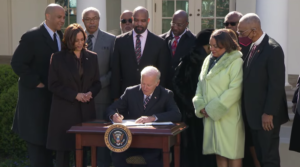
Greenwood Tips Hat to Emmett Till’s Legacy with World’s Only Statue Honoring the Boy Who Ignited the Civil Rights Movement
When taking a walking tour or just a casual stroll through Greenwood, Mississippi’s Rail Spike Park, you can’t miss a 9-foot-tall bronze statue of a young, joyful boy dressed in a button-down shirt and slacks with his left hand tipping his hat and a smile on his face: this is 14-year-old Chicago native, Emmett Till.
 Emmett Till was a kind young man from the South Side of Chicago. Family members say he enjoyed cooking and helping his mother around the house, loved sports and often cracked jokes. But his murder on August 28, 1955, is what most people know — an event that forced a nation to face the consequences of racism.
Emmett Till was a kind young man from the South Side of Chicago. Family members say he enjoyed cooking and helping his mother around the house, loved sports and often cracked jokes. But his murder on August 28, 1955, is what most people know — an event that forced a nation to face the consequences of racism.
The city of Greenwood — located right outside of Money, Mississippi, where Till stayed that fateful summer— was determined to keep Till’s memory alive. State Senator David Jordan secured $150,000 in state funding to create the bronze statue for the purpose of educating residents and visitors for years to come.
“What we have to do in dedicating this monument to Emmett Till is recommit ourselves to the spirit of making a difference in our community,” U.S. Rep. Bennie Thompson told The Vicksburg Post.
Matt Glenn, a Utah artist who designed and built the towering Till statue, said, “The message is that Emmett Till’s tragedy created so much energy for the Civil Rights Movement, we wanted to make him larger than life.”
In October 2022, applause and tears filled a crowd as the monument commemorating Emmett Till was unveiled. It was a poignant moment for the community as the statue’s location is less than 10 miles from where the tragedy occurred. It is the only statue in the world that pays homage to the young boy whose story changed history.
“This is a great day as we take another leap forward in recognizing the life and legacy of Emmett Till,” said Rev. Wheeler Parker Jr. — Till’s cousin and only remaining family member who saw him the night he was kidnapped.
 The statue’s unveiling came just a week after the release of “Till,” a film detailing the untold chapter of Till’s story centered around his mother, Mamie Till-Mobley — a woman who focused her unimaginable grief into action and championed civil rights activism for the greater good. Till’s death became a rallying point for the movement, but few know that his mother was the catalyst for bringing his name to the national forefront of people’s hearts and minds.
The statue’s unveiling came just a week after the release of “Till,” a film detailing the untold chapter of Till’s story centered around his mother, Mamie Till-Mobley — a woman who focused her unimaginable grief into action and championed civil rights activism for the greater good. Till’s death became a rallying point for the movement, but few know that his mother was the catalyst for bringing his name to the national forefront of people’s hearts and minds.
Back in Chicago, before laying her son to rest, Till-Mobley declined an offer from the mortician to “touch up” her son’s body and decided to have an open-casket funeral.
“I think everybody needed to know what had happened to Emmett Till,” she said.
This decision ultimately lit a match, igniting a movement that would alter the course of history and create an inspirational touchstone for an entire generation after Jet, an African American magazine, ran graphic photos of Till’s body from the funeral — forcing Americans to stare directly into the face of racism.

Emmett Till inspired some of the most well-known civil rights activists to date. Just four months after Till was murdered, Rosa Parks refused to give up her seat on a Montgomery bus, sparking the Montgomery Bus Boycott that further energized the movement. Years later, Jesse Jackson asked Parks why she refused to move to the back of the bus. Parks replied, “I thought of Emmett Till, and I couldn’t go back.”
Fast forward to 1963, when organizers selected August 28th (the day Till was murdered eight years earlier) to enact the March on Washington, where Martin Luther King Jr. gave his famous “I Have a Dream” speech.
Even now, in 2023, when asked what inciting incident motivated his activism, six-time NBA champion Kareem Abdul-Jabbar responded, “It was the murder of Emmett Till that bothered me. I couldn’t understand it. I asked my parents to explain it, and they didn’t have the words. So I spent my life since then trying to figure out how to get us to tamp down on hatred and learn to know, respect, and love each other….”

In the same year, the statue was erected, after more than a century of efforts by civil rights, President Joe Biden signed the Antilynching Act into law on March 29, 2022 – officially designating lynching as a federal hate crime in the U.S.
Seeing the statue in person and witnessing the legacy in person is an unforgettable experience. It’s worth the trip to Greenwood to experience not only the powerful presence of the Emmett Till statue. but to learn more about Greenwood’s history, which includes its important role in Civil Rights history. If you have a few extra days, from Greenwood’s location in the heart of the Delta of Mississippi, you can explore a broader footprint of Civil Rights history in other parts of the Delta.
Click Here to download Greenwood’s Civil Rights History guide packed with walking maps and historical information.



